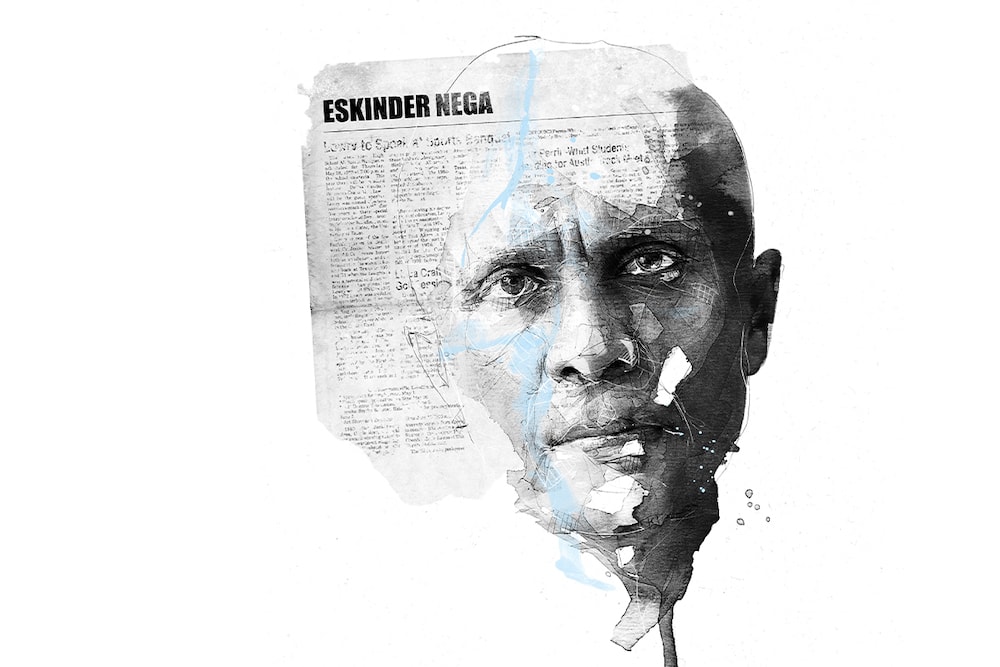Renowned journalist and a vocal critic of the Ethiopian government, Eskinder Nega has been imprisoned multiple times under several governments for his efforts to defend democracy and press freedom in the country.
"As a journalist, I hope to be one of the voices of the people."
Eskinder Nega’s advocacy for press freedoms and the rule of law as a journalist, writer, and human rights defender, has earned him global recognition. Nega has been a fierce critic of Ethiopian authorities. He has been imprisoned multiple times under several governments for his efforts to promote free expression and democracy in the country, and is a powerful symbol of press freedom in Africa.
He has received numerous awards and recognition over the years. In 2012 he was honoured with the prestigious PEN/Barbara Goldsmith Freedom to Write Award for his courage in the face of persecution. He was also awarded the Golden Pen of Freedom Award by the World Association of Newspapers and News Publishers in 2014, and the International Press Institute (IPI)’s World Press Freedom Hero award in 2017.
Born in 1966, Nega began his journalism career in the 1990s and quickly established himself as a leading voice in his country’s media scene by launching the independent newspaper Ethiopis. Authorities soon shut it down. Nega also worked as general manager of Serkalem Publishing House, which produced the independent newspapers Menelik, Sateneaw, and Asqual, all of which were shuttered for their critical articles.
Nega’s criticism of the Ethiopian government led to his first arrest in 1993 when he was charged with spreading “false information” and spent over a year in prison. In 2005, Nega and his wife Serkalem Fasil, in addition to a dozen other journalists, were arrested and charged with treason – charges associated with their reporting on a violent crackdown by the government following disputed parliamentary elections. Serkalem would later give birth to the couple’s son while still in prison, in 2006. The journalist couple were released in 2007, but were denied permission to launch any new newspapers.
In February 2011, Nega was briefly detained – allegedly for attempting to “incite Egyptian and Tunisian-like protests”. He was then arrested in September 2011 under the country’s draconian anti-terrorism law, after publishing a column questioning government claims that the journalists it had detained earlier were suspected terrorists, and for criticising the arrest of Ethiopian actor Debebe Eshetu on terror charges. He was sentenced to 18 years in prison.
Released in February 2018 after serving nearly seven years at Lakiti Prison in Addis Ababa, Nega was among 746 Ethiopian prisoners pardoned by then Prime Minister Hailemariam Desalegn, following pledges to release jailed prisoners of conscience. The harassment and persecution continued. One month after his release, Nega was re-arrested at a social event for allegedly displaying a prohibited Ethiopian flag; he was later released, without official charges filed. Despite this, the harassment persisted as authorities prevented the journalist from holding press conferences in June 2019 to announce plans for a new independent TV station, Senai.
Venturing into the political arena, in March 2019 he helped establish the Addis Ababa Baladera Council, to advocate for an elected Mayor for the capital city. Months later, the advocacy group was transformed into a political party called Balderas for Genuine Democracy.
In July 2020, Eskinder was physically assaulted and detained by armed security forces during a widespread protest in the capital sparked by the killing of a popular Oromo singer. Faced once again with terrorism charges, Nega remained in detention during the June 2021 parliamentary elections. After nearly 18 months in detention he was released in January 2022 following a pardon of political prisoners by Prime Minister Abiy Ahmed. Nega resigned as the party’s leader in August 2022, writing that his decision was “due to dictatorial pressure from the reigning repressive government on Balderas [party] and at the national level” that had made his leadership untenable. He would not remain in a space where power was being abused.
Several months later, Eskinder Nega joined The Fano, an Amhara nationalist militia with historical roots, which gained support amid concerns of genocide and cultural decline. Confronted with claims of group’s complicity in human rights abuses, Nega has maintained that its ethos is grounded in justice and patriotism. In his acknowledgment of the allegations, he has called for comprehensive and impartial investigations. Given his position, only time will tell whether Nega will be able to sustain his commitment to the principles of justice and accountability.
Illustration by Florian Nicolle

